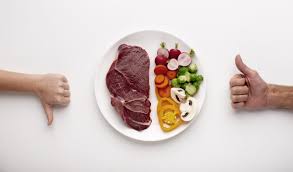The question of whether meat should be a part of the human diet has sparked intense discussions for decades. Arguments for and against eating meat are often based on evolutionary history, human anatomy, ethical reasoning, and personal belief systems.

Depending on who you ask—and the experiences they’ve had—you’re likely to hear perspectives that are deeply personal or broadly philosophical.
In this article, we’ll explore different viewpoints and scientific findings to assess whether humans are “designed” to eat meat.
Human Anatomy and Evolution: Are We Built to Consume Meat?
Survival and evolution go hand in hand, with humans constantly adapting to their environments, including changes in available food sources.
Genetic studies show that humans have been evolving for over 300,000 years, continually adjusting to the world around them (1Trusted Source).
Because humans are so adaptable, the idea that we must adhere to an ancient, unchanging diet doesn’t really hold up. Early mammals—our distant ancestors—were predominantly meat-eaters, but over time, many species have shifted to plant-based diets (2Trusted Source).
Human dentition offers further clues. The structure of our teeth indicates an omnivorous diet. Our incisors, molars, and premolars resemble those of herbivores, suitable for chewing plant matter. Meanwhile, our canines are shaped to help tear meat, similar to carnivores (3Trusted Source).
What Does Our Biology Indicate?
Humans can digest a wide range of plant-based foods, including fruits, vegetables, seeds, and roots. However, we can’t break down everything plants have to offer.
The cell walls of plants contain tough fibers like cellulose and lignin—substances that require the enzyme cellulase to digest. Humans lack this enzyme, which means we can’t fully break down plant cell walls (4Trusted Source).
While some herbivores also lack cellulase, they house gut bacteria that produce it for them—something human digestive systems don’t do (5Trusted Source, 6Trusted Source).
In contrast, our digestive systems are well-equipped to process meat. Our bodies naturally produce enzymes such as protease and lipase, which help us digest protein and fat found in animal products (7Trusted Source).
The length of our digestive tract also supports our omnivorous nature. Carnivores tend to have shorter digestive tracts, since meat is calorie-rich and easier to absorb. Herbivores, needing to extract nutrients from less energy-dense plant matter, have much longer intestines (8Trusted Source). Human digestive tracts fall somewhere in the middle, consistent with a diet of both plants and meat (9Trusted Source, 10Trusted Source).
Is Meat a Nutritional Requirement?
There are several nutrients that are either difficult or impossible to get from a strictly plant-based diet.
One major example is vitamin B12, essential for neurological function and the formation of red blood cells. This nutrient is found almost exclusively in animal-derived foods (11Trusted Source, 12Trusted Source). People who avoid all animal products are generally advised to take B12 supplements.
Other nutrients, like creatine, vitamin D3, and the omega-3 fatty acid DHA, are also limited in plant foods. While the human body can produce small amounts of these on its own, it doesn’t do so efficiently (13Trusted Source). Studies show that vegans and vegetarians often have lower levels of DHA and EPA, so algae-based supplements are commonly recommended (14Trusted Source, 15Trusted Source, 16Trusted Source, 17Trusted Source).
It’s also worth noting that diets including dairy (lacto-vegetarian), eggs (ovo-vegetarian), or fish (pescatarian) can supply many of these essential nutrients.
Still, people following vegetarian or vegan diets often need to pay special attention to nutrients like iron, which plants contain in a less absorbable form (18Trusted Source, 19Trusted Source, 20Trusted Source), as well as protein, zinc, iodine, calcium, and vitamin D (21Trusted Source, 22Trusted Source, 23Trusted Source, 24Trusted Source).
Health Impacts of Mixed vs. Plant-Based Diets
Eating meat—particularly processed meat—has been linked with certain health risks. For instance, frequent consumption of processed meats has been associated with a slightly elevated risk of colorectal cancer and other chronic conditions (25Trusted Source, 26Trusted Source, 27Trusted Source, 28Trusted Source).
Conversely, well-planned plant-based diets have been shown to reduce the risk of heart disease and may offer some protection against certain cancers, though the research is ongoing and not always consistent (29Trusted Source, 30Trusted Source, 31Trusted Source, 32Trusted Source).
In any case, individuals following plant-based diets need to plan carefully and may require supplementation to meet their nutritional needs (33Trusted Source).
Cultural Context: Does Your Heritage Include Meat?
Cultural background plays a major role in shaping eating habits. The dishes and food traditions handed down through generations often include meat as a central ingredient.
Many societies have relied on animal products for sustenance, shaped by geography, religion, and local biodiversity. For people in those communities, eating meat is not just about nutrition—it’s about identity, heritage, and belonging.
Connecting to one’s cultural roots through food can be deeply meaningful. Whether you include or exclude meat from your diet may stem from this cultural connection, and that is entirely valid (34Trusted Source).
Final Thoughts
There’s no biological rule that says humans must eat meat—but there’s also nothing preventing us from doing so. Human bodies are well-equipped to digest both animal and plant foods.
Personal, ethical, religious, and cultural beliefs often influence whether someone chooses to eat meat or not.
If you’re exploring your dietary choices, keep in mind that there’s no one-size-fits-all answer. Whether you’re leaning toward a vegan lifestyle or looking to preserve your family’s culinary traditions, the choice is yours to make—and that choice can be both personal and evolving.


I agree with the article’s perspective that humans are naturally omnivores. Our digestive systems and teeth are clearly adapted to handle both plant and animal foods. While plant-based diets are healthy, meat has been an important part of human nutrition for thousands of years.
I respectfully disagree. I believe humans thrive better on a mostly plant-based diet. Many health studies link excessive meat consumption to chronic diseases, and ethically, we should consider reducing or eliminating meat. Our bodies can get all nutrients needed from plants if we eat wisely.
The article raises good points about human evolution and diet flexibility. I think it’s less about being “meant” to eat meat and more about adapting to available food sources. Personally, I enjoy a balanced diet with moderate meat and plenty of veggies, which works best for me.